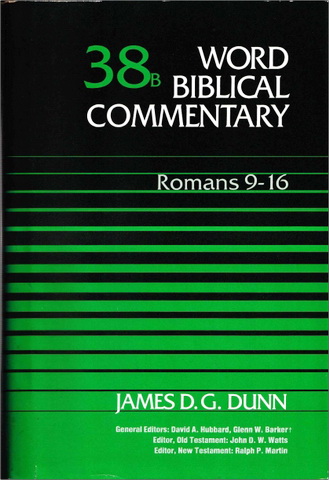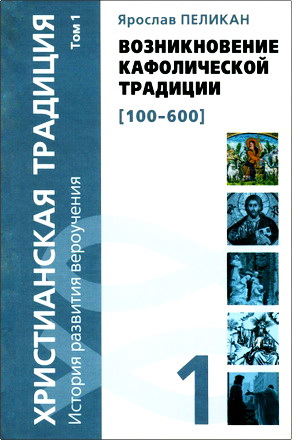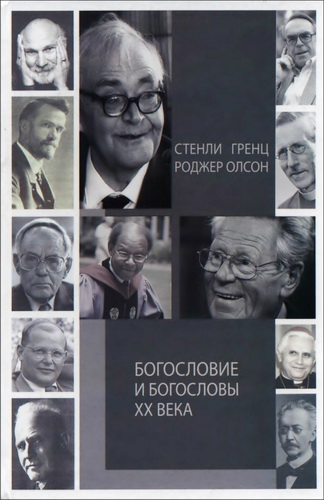
Dunn - Romans - World Biblical Commentary - Джеймс Данн
To write a commentary on the apostle Paul’s letter to the Christians in Rome is a daunting undertaking. Paul’s letters are such a dominant element in the New Testament, and so form a central part of the Christian scriptures, the constitutional documents of the Christian faith, which have exercised an influence quite literally beyond measure on Christian faith and life and on Western culture for more than nineteen centuries. And of all Paul’s letters the one to Rome is the fullest and most carefully constructed statement of the Christian gospel and of the faith it called for during the foundation period of Christianity. To grapple with Romans is to engage in dialogue with one of the most creative theological minds of all time from the most creative period of Christian thought. Its influence on seminal theologians like Augustine, Luther and Barth has often been noted. And certainly it seems to have attracted more commentaries of note than any other NT or biblical writing. On not a few occasions during the writing of this commentary I have felt that^even to attempt to follow in the train of commentators of the stature of Calvin, Godet, Sanday & Headlam, Lagrange, Michel, Kuss, Kasemann, Cranfield, Schlier and Wilckens is an act of foolhardiness at times bordering on impiety.
When the possibility of contributing Romans to the Word Biblical Commentary was put to me ten years ago I almost declined the invitation. I had of course worked with Romans frequently in the past, had indeed learnt the AV/KJV translation by heart as a young Christian, and relished the possibility of a sustained inquiry into this most systematic contribution of one whom I personally regard as the greatest theologian of all time. But with so many commentaries of high merit already on the shelves, why inflict another on fellow students of the NT? “Not another commentary on Romans!” was a frequent response when I described my research project in the early ’80s. A sentiment that echoed my own first reaction. After such a wealth of scholarship has been expended on Romans over the years, is there anything fresh or original to be said? Would I not simply fall into one of the worst errors of the commentary genre—that of simply repeating the thoughts (in a different “mix”) of those who had gone before?
On further reflection, however, I came to the conclusion that there were probably two areas where a further contribution would be possible and indeed desirable, two deficiencies which affected most previous work on Romans in greater or less degree. One was that in many large commentaries readers were frequently prevented from seeing the wood for the trees. With the commentator immersed in meticulously detailed word study, or complex debate regarding alternative renderings, or lengthy analyses of previous interpretations, the movement of Paul’s thought was often lost sight of, and readers could find themselves very easily lost in a maze of detail. A letter written to be read out as a live exposition, and to be heard (and understood) at one or two sittings, had too often become as it were an antique corpse to be dissected over and over again in the mortuary of Christian curiosities so that its individual parts and limbs could be held up to mawkish display. Of course there had been several attempts to provide brief overview commentaries, some of them singularly successful on the whole, but mostly they had either skimmed the surface without penetrating into the depth of the argument, or they had succumbed to the second deficiency. This second weakness was the failure of most commentators to penetrate more fully into the historical context within which the letter was written and to which the letter was addressed, the life-setting in which it was first heard to speak as the word of God. The blinkers which for centuries have narrowed and distorted Christian appreciation of first-century Judaism also affected the view of Paul in relation to his ancestral faith, a relationship so very much at the heart of this letter in particular. But with the perspective-shifting work of E. P. Sanders fresh in mind it quickly became clear to me that a major attempt to set Paul’s letter to Rome within “the new perspective on Paul” could and should be undertaken.
James D.G. Dunn - Romans 1-8
(Word Biblical Commentary, Volume 38A)
WORD BOOKS, PUBLISHER, DALLAS, TEXAS, - 1988. - 584 pp.
ISBN 0-8499-0237-1 (vol. 38A)
James D.G. Dunn - Romans 1-8 - Contents
Editorial Preface
Author’s Preface
Abbreviations
General Bibliography
Commentary Bibliography
ROMANS 1-8: TEXT AND COMMENTARY
I. Introduction (1:1—7)
A. Introductory Statement and Greetings (1:1-7)
B. Personal Explanations (1:8-15)
C. Summary Statement of the Letter’s Theme (1:16-17)
II-V. The Righteousness of God—from God’s Faithfulness to Man’s Faith (1:18—11:36)
II—III. The Righteousness of God—to Man’s Faith (1:18-5:21)
II. The Wrath of God on Man’s Unrighteousness (1:18-3:20)
A. God’s Wrath on Humankind—from a Jewish Perspective (1:18-32)
B. God’s Wrath—on Jew First As Well As, Gen tile (2:1-3:8)
1. The Impartiality of God (2:1—11)
2. Possession of the Law No Safeguard (2:12—16)
3. Favored Status No Security (2:17—24)
4. Circumcision No Guarantee (2:25—29)
5. What Then of God’s Faithfulness? (3:1—8)
C. Conclusion: God’s Judgment on All without Exception (3:9-20)
III. God’s Saving Righteousness to Faith (3:21-5:21)
A. To Faith in Christ Jesus (3:21—31)
1. The Decisive Demonstration of God’s Righteousness in the Death of Jesus (3:21—26)
2. The Consequences for the Self-Understanding of the Jewish People (3:27—31)
B. Abraham as a Test Case (4:1—25)
C. First Conclusions: The New Perspective of Faith in Relation to the Individual and to Humanity at Large (5:1-21)
1. The New Perspective on the Believer’s Present and Future (5:1—11)
2. The New Perspective on God’s Righteous Purpose for Humankind (5:12-21)
IV—V. The Outworking of This Gospel in Relation to the Individual and to the Election of Grace (6:1-11:36)
IV. The Outworking of the Gospel in Relation to the Individual (6:1-8:39)
A. Does Grace Encourage Sin? (6:1—23)
1. The Believer Has Died to Sin (6:1—11)
2. The Believer Should Therefore Live to God (6:12-23)
B. What Role Does the Law Play in All This? (7:1-25)
1. The Believer Has Been Released from the Law Which Condemned to Death (7:1—6)
2. But the Law Is Still Exploited by Sin and Death, As Experience Demonstrates (7:7—25)
C. The Eschatological Tension and Fulfillment of God’s Purpose through the Spirit (8:1—30)
1. The Spirit of Life (8:1—11)
2. The Spirit of Sonship (8:12-17)
3. The Spirit as Firstfruits (8:18-30)
D. Second Conclusion: The Triumph of God—His Faithfulness and the Assurance of Faith (8:31-39)
James D.G. Dunn - Romans 9-16
(Word Biblical Commentary, Volume 38B)
WORD BOOKS, PUBLISHER, DALLAS, TEXAS, - 1988. - 497 pp.
ISBN 0-8499-0252-5 (vol. 38B)
James D.G. Dunn - Romans 9-16 - Contents
V. The Righteousness of God—from God’s Faithfulness: The Outworking of the Gospel in Relation to Israel (9:1-11:36)
A. What Then of Israel? Paul's Concern for His Kinspeople (9:1-5)
B. The Call of God (9:6-29)
1. The Character of God's Free Choice (9:6-13)
2. Those Not Chosen Are Still within the Purpose of God (9: 14-23)
3. Those Called Include Both Jews and Gentiles, As Prophesied (9:24-29)
C. The Word of Faith (9:30-10:21)
1. Israel Has Misunderstood God's Righteousness (9:30-10:4) 578
2. The Righteousness from the Law and the Righteousness from Faith (10:5-13)
3. Israel's Failure to Respond to the Gospel (10:14-21)
D. The Mystery of God's Faithfulness (11:1-32)
1. The Remnant According to Grace-and the Others (11: 1-10)
2. The Hope of Israel's Restoration (11:11-24)
3. The Final Mystery Revealed (11:25--32)
E. A Concluding Hymn of Adoration (11 :33-36)
VI. The Outworking of the Gospel for the Redefined People of God in Everyday Terms (12:1—15:13)
A. The Basis for Responsible Living-the Christian's Worship (12:1-2)
B. The Body of Christ as the Social Context of Faith (12:3-8)
C. Love as the Norm for Social Relationships (12:9-21)
D. Live as Good Citizens (13: 1-7)
E. Love of Neighbor as the Fulfillment of the Law (13:8--10)
F. The Imminence of the End as Spur (13:11-14)
G. The Particular Problem of Food Laws and Holy Days (14:1-15:6)
1. The Problem Posed: The Challenge to "the Weak" (14:1-12)
2. The Responsibility of "the Strong" (14: 13-23)
3. Christ as Exemplar (15: 1-6)
H. Concluding Summary: God's Mercy and Faithfulness-Jew First, but Also Gentile (15:7-13)
VII. Conclusion (15:14—16:27)
A. Paul's Mission and Travel Plans (15:14-33)
1. Paul's Mission (15:14-21)
2. Paul's Travel Plans (15:22-33)
B. Final Greetings (16: 1-23)
1. Commendation of Phoebe (16:1-2)
2. Greetings (16:3-16)
3. A Final Personal Note (16: 17-20)
4. Adtlitional Greetings (16:21-23)
C. Concluding Doxology (16:25-27)
Indexes





Комментарии (5 комментариев)
Дякую за хороший коментар! Побільше б книг такої якості!
Гарний коментар, щоб познайомитись з новою перспективою на Павла. Особисто для мене після поширеної кальвінстської інтерпретації це з одного боку як свіжий ковток повітря, а з іншого виклик, щоб це зрозуміти і переосмислити. Серед плюсів я би відзначив, що сам автор аргументує свої погляди досить чітко і зрозуміло, співставляючи з іншими інтерпретаціями. Англійська, на мою думку, як не для носія мови, є досить "читабельна", що теж є великим плюсом. Велике спасибі за цю працю!
О! Потрясающе! Низкий поклон и уважение за сей комментарий!
Огромная благодарность!!!